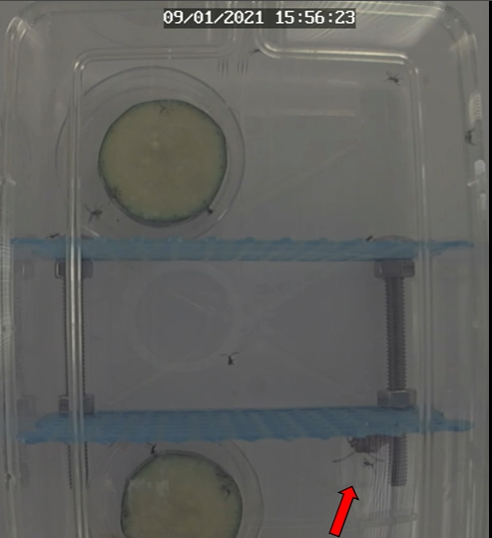Squash bugs, a common and difficult-to-control agricultural pest, need healthy bacteria in their gut to grow and stay alive. However, they do not acquire any bacteria from their parents when they are first born, leaving them vulnerable until their microbiome can be stocked. Researchers report in the journal Current Biology on June 28 that, to acquire these healthy bacteria, young bugs innately seek out and eat the poop from older squash bugs.

Credit: Current Biology/Villa and Chen et al.
Squash bugs, a common and difficult-to-control agricultural pest, need healthy bacteria in their gut to grow and stay alive. However, they do not acquire any bacteria from their parents when they are first born, leaving them vulnerable until their microbiome can be stocked. Researchers report in the journal Current Biology on June 28 that, to acquire these healthy bacteria, young bugs innately seek out and eat the poop from older squash bugs.
“This is a directed behavior. They’re not just feeding on something that has feces on it because they live in a gross environment. They’re deliberately seeking out the feces and slurping it up,” says Jason Chen (@thyreodon), a graduate student in biology at Emory University and co-first author of the paper. “We show that the squash bug nymphs only feed on feces from adults of their own species.”
To test this, the researchers set up “arenas” to see what squash bug nymphs would gravitate toward if they were given a choice. When presented with the option of poop or saline, nymphs repeatedly moved toward the poop from the adults of their species, even in the dark or from a long distance away. After investigating further, the team found that the bugs might be attracted to the poop’s smell.
“It’s just as simple a test as you could possibly design, and what made it so great was how clear and shocking the results were,” says Scott Villa (@ScottVilla), a biology professor at Davidson College and co-first author of the paper. “They just immediately went to the side where there was fecal matter available.”
The researchers filmed this feeding behavior and noted that, when the bugs found their way to the poop, they used their mouthparts to drill into the mass and liquified the feces with their saliva. The bugs then slurped up the poop with their tongues. This kind of feeding behavior has not been described in squash bugs before.
While other bugs build their microbiome from poop in the environment, this usually occurs when the mother leaves her own poop on top of the eggs she lays, so hatchlings can eat these healthy bacteria as soon as they are born. In contrast, these squash bugs have to seek out these feces in the environment or die.
“A lot of the other species don’t need this attraction behavior because it’s on a platter for them as soon as they hatch. Our guys have to work for it,” says Villa. “For something this important, you should automatically pass it on to your kids, but they don’t for some reason. That’s the intriguing part.”
Next, the team plans to focus on why squash bugs expend extra energy acquiring healthy bacteria in this way. In the meantime, the discovery of squash bugs’ species-specific fecal preference might be helpful in developing pest control against them. Squash bugs feed on the fluids inside of leaves instead of chewing them, making many conventional pesticides ineffective. However, their vulnerability without a microbiome and preference for poop from their own species might be an interesting weakness to exploit.
“These pests are very difficult to control, because they’re not exposed to conventional insecticides,” says Chen. “But if you can target them at this vulnerable stage in the life cycle, that’s a really nice way to target a specific agricultural pest and nothing else in the ecosystem.”
###
This work was supported by the National Institutes of Health, USDA, Emory University, an Institutional Research and Academic Career Development Award (IRACDA), and the Fellowships in Research and Science Training (FIRST) postdoctoral program.
Current Biology, Villa et al. “Specialized acquisition behaviors maintain reliable environmental transmission in an insect-microbial mutualism” https://www.cell.com/current-biology/fulltext/S0960-9822(23)00724-8
Current Biology (@CurrentBiology), published by Cell Press, is a bimonthly journal that features papers across all areas of biology. Current Biology strives to foster communication across fields of biology, both by publishing important findings of general interest and through highly accessible front matter for non-specialists. Visit: http://www.cell.com/current-biology. To receive Cell Press media alerts, contact [email protected].
Journal
Current Biology
DOI
10.1016/j.cub.2023.05.062
Method of Research
Experimental study
Subject of Research
Animals
Article Title
Specialized acquisition behaviors maintain reliable environmental transmission in an insect-microbial mutualism
Article Publication Date
28-Jun-2023




